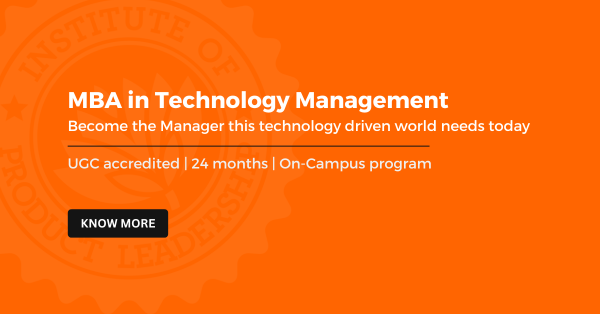Disadvantages of Doing an MBA After Engineering: What No One Tells You
- Career
- 4 min read
Let’s be honest, everyone talks about the advantages of doing an MBA after engineering. Higher pay, career switches, fancier job titles, better networking… the works.
But what about the downsides?
Because while an MBA can be a great move, it’s not some magic wand that automatically solves all your career problems. There are trade-offs, and many engineers only realize them after they’ve already signed the cheque and left their jobs.
In this blog, let’s flip the script and talk about the less glamorous side of this career move.
A. What Are the Disadvantages of Pursuing an MBA After Engineering?
Before you commit to an MBA course after BTech, here are some things to be aware of:
1. It Can Be a Financial Gamble
Let’s get the obvious out of the way- MBAs are expensive. We’re talking ₹15–40 lakhs in India, and well over ₹1 crore if you’re looking abroad.
And no, this isn’t just “fees.” You’re also giving up:
- Two years of salary (opportunity cost)
- Potential promotions and experience in your current role
- The ability to save or invest during that time
Now, if you land a job post-MBA that pays ₹25–30 LPA and grows consistently, the ROI works out. But if you end up in an average role or in the wrong specialization, it might take years just to break even.
Bottom line: The MBA pays off only if you do your homework—choose the right school, specialization, and go in with clarity.
2. Not All MBAs Are Created Equal
This is a bitter pill: Some MBA programs don’t actually offer that much value.
They might have great marketing and a shiny brochure, but:
- The faculty may be outdated or purely academic
- The curriculum may lack real-world relevance
- The placement support might be weak
- The peer group might not push you to grow
In such cases, students often end up spending lakhs- only to take extra online certifications to actually gain job-ready skills.
Reality check: Brand name isn’t everything. Focus on industry exposure, alumni network, and real learning outcomes.
Suggested Read: MBA After Engineering: Is It the Right Choice for You?
3. It’s Not a Shortcut to Success
Many engineers go into an MBA expecting a transformation. A complete 180. A brand-new identity.
But here’s the truth- your MBA is only as good as the effort you put in.
- If you don’t explore different domains, you’ll stay confused
- If you don’t build soft skills, you’ll struggle in interviews
- If you don’t take initiative (projects, networking, personal branding), your resume will blend into the crowd
Key takeaway: The MBA isn’t a shortcut. It’s a high-pressure, high-investment environment that rewards action. If you coast through it, don’t expect miracles.
4. You Might End Up Just as Confused
This one’s more common than you think.
A lot of engineers pursue an MBA to “figure out” what they want to do. Which is fine—to an extent. But if you go in with zero clarity, no direction, and just vibes, you might come out with a degree… and the same level of confusion.
Worse, you’ll be saddled with loans and expectations, and no clear idea of what roles you even want to apply for.
What helps:
- Take stock of what actually excites you (tech? people? strategy? design?)
- Talk to alumni or mentors before you commit
- Choose a program that lets you explore multiple areas early on (like in Blog 3)
5. It Can Be Emotionally Draining
Not many people talk about this.
The pressure to perform, constant peer comparison, tight timelines, and job hunts can take a toll. Especially if you’ve left a stable job to pursue this path. You’ll question your decision. You’ll feel imposter syndrome. You might burn out.
And while the outcome can be totally worth it, don’t underestimate the intensity of the journey.
Pro tip: Choose a program that offers coaching, mentorship, and mental wellness support, especially if it’s a full-time course.
B. Is an MBA After Engineering Overrated?
This is a fair question- and the answer is: It depends on how you approach it.
It IS overrated if:
- You do it just because you don’t like coding
- You pick a random specialization without research
- You expect it to “fix” your career without effort
- You pick a program solely based on brand and fees
It ISN’T overrated if:
- You go in with clarity on what skills and roles you want
- You actively explore and experiment during the course
- You leverage the network, projects, and mentors
You treat it like a launchpad, not a safety net
So, Should You Still Consider an MBA?
Yes- but only if:
- You’ve researched the ROI
- You’re clear (or becoming clear) about your goals
- You’re choosing a specialization that aligns with your interests
- You’re ready to put in the work- inside and outside the classroom
- You view the MBA as a platform to grow- not just a piece of paper to earn
An MBA isn’t for everyone. And that’s okay.
But if you’re someone who enjoys both problem-solving and people, logic and leadership, detail and direction- then an MBA after engineering could be exactly the leap you need.
Suggested Read: MBA vs MTech: Which One Should You Choose After BTech?
So, Is an MBA After Engineering the Right Move?
Here’s the honest truth- there’s no one-size-fits-all answer.
An MBA after engineering can open doors you didn’t even know existed. It can help you move from building tech to leading teams, crafting strategy, and influencing real business outcomes. It can boost your salary, accelerate your growth, and help you see the bigger picture.
But it’s not a magic wand. It won’t solve confusion, fix burnout, or guarantee success. You still have to do the hard work—introspect, build real-world skills, and stay curious.
So before you apply to any B-school, ask yourself:
- Do I want to solve business problems, not just technical ones?
- Am I ready to lead, not just follow instructions?
- Am I clear about where I want to grow, or at least ready to explore?
If the answer is yes, then go for it.
But do it for you, not for the trend, not for the title, not just for the paycheck.
Because when you combine your technical foundation with business thinking, you don’t just level up your career, you become the kind of professional the future is already looking for.






